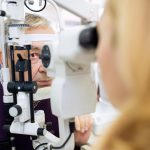
In a finding that suggests more Americans than ever are struggling with their sight as they get older, researchers report that nearly 20 million adults have age-related macular degeneration (AMD). Broken down, about 18.3 million people aged 40 and up had an early stage of the condition in 2019, while almost 1.5 million people had late-stage AMD. “There haven’t been many new examination-based studies of the prevalence of AMD, and the only nationally representative data on AMD were last collected in 2008. So, this limits the ability of researchers to update the estimates,” said study author David Rein, director of the public health analytics program at NORC at the University of Chicago. “I think a strength of our study is our use of other data sources such as Medicare claims and population data from the Census Bureau to create contemporary estimates.” AMD is one of the leading causes of blindness in the United States. It is characterized by intermediate-sized drusen, which are deposits under the retina, and retinal pigment epithelium abnormalities. It affects the macula, which is part of the retina that controls sharp, straight-ahead vision, according to the U.S. National Eye Institute. The condition comes in two forms: Dry AMD involves the thinning of the macula, while wet AMD is less common and causes faster vision loss. With wet AMD, abnormal blood vessels grow… read on > read on >
















